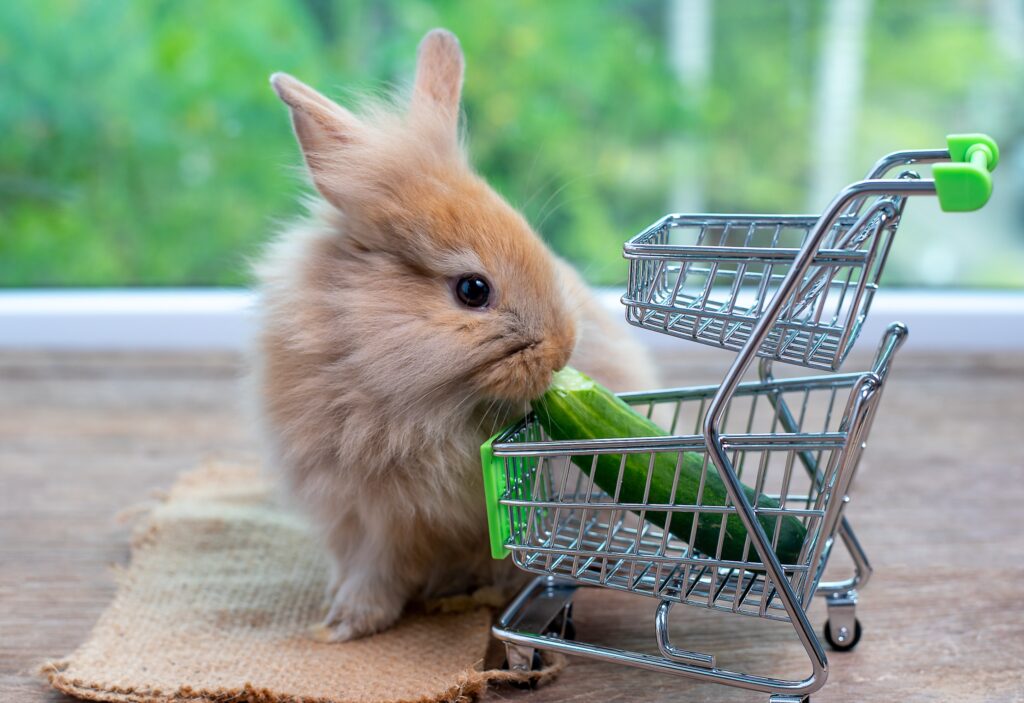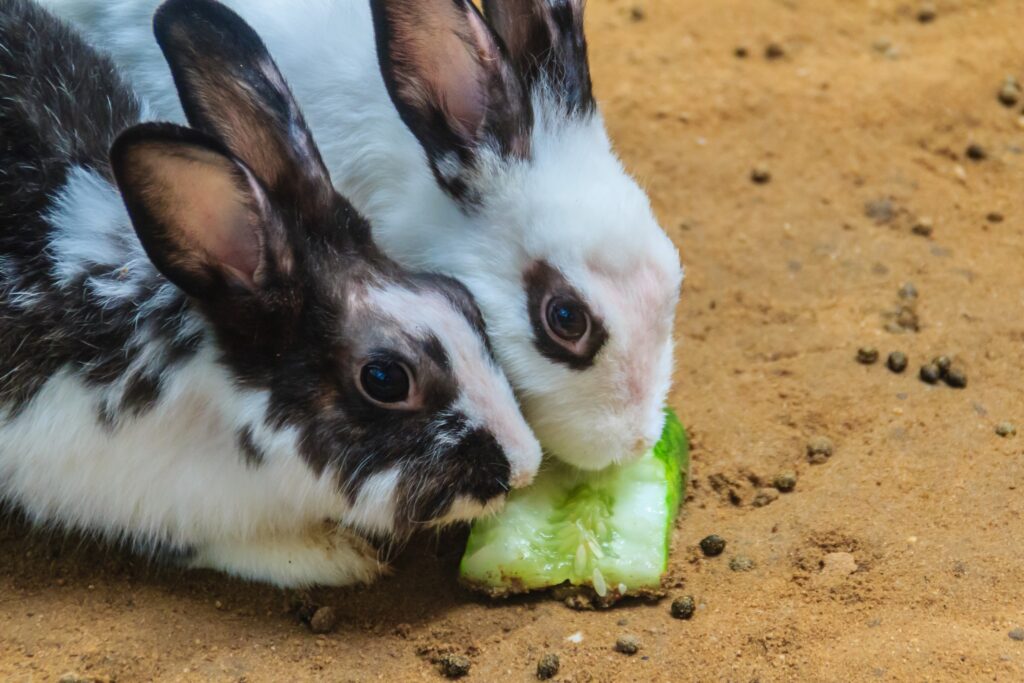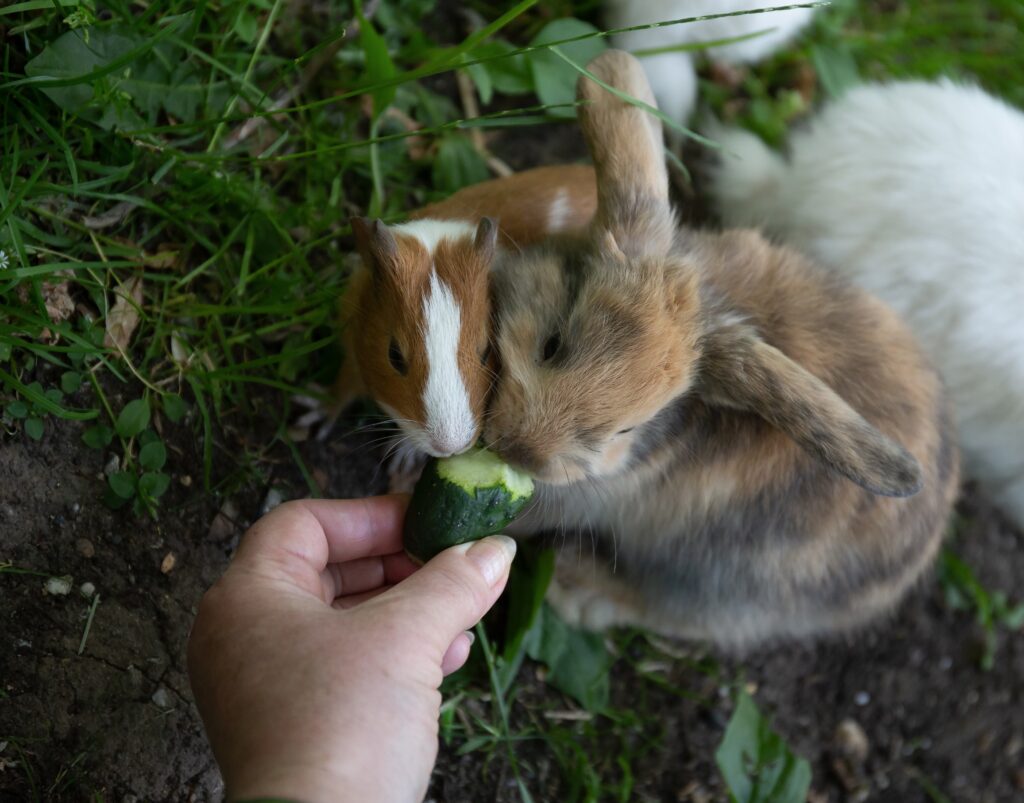Can Rabbits Eat Cucumbers? A Comprehensive Guide
Rabbits are adorable and popular pets that require a balanced diet to maintain good health. As an herbivore, a rabbit’s diet should consist mainly of hay, fresh vegetables, and water. However, not all vegetables are safe for rabbits, and some can harm their health. One vegetable that rabbit owners often wonder about is cucumber.

Rabbits can safely eat cucumber flesh, skin, and seeds. However, it is important to note that cucumber contains few nutrients and has a high water content, which can cause diarrhea if eaten in excess. Therefore, feeding rabbits cucumber in moderation is recommended, such as a thin slice 2-3 times per week.
It is also important to pay attention to the type of cucumber given to rabbits. Organic cucumbers are the best choice for rabbits, as they are free of harmful chemicals and pesticides. If you are concerned about your rabbit choking on the seeds, removing them before feeding cucumber pieces or opting for a seedless variety is best. Cucumbers can be a healthy and enjoyable treat for rabbits when given in moderation and prepared correctly.
Nutritional Value of Cucumber for Rabbits
Cucumber is a popular vegetable often enjoyed by humans, but can rabbits eat cucumber? The answer is yes; rabbits can eat cucumber in moderation as a refreshing and hydrating treat. However, cucumber should only be given occasionally due to its low fiber content. A rabbit’s diet should consist mainly of hay, water, rabbits’ pellets, and various leafy greens and other vegetables.
Cucumber is a low-calorie vegetable that is high in water content. It is a good Vitamin K, Vitamin C, fiber, and potassium source. However, it contains few other nutrients that are essential for rabbits. Therefore, it should not be the main source of nutrition for rabbits.
Here is a table that shows the nutritional value of cucumber for rabbits:
| Nutrient | Amount per 100g |
| Calories | 15 |
| Protein | 0.6g |
| Carbohydrates | 3.6g |
| Fiber | 0.5g |
| Fat | 0.1g |
| Vitamin K | 16.4mcg |
| Vitamin C | 2.8mg |
| Potassium | 147mg |
As you can see from the table, cucumber is a low-calorie vegetable that is high in water content. It is a good Vitamin K, Vitamin C, fiber, and potassium source. However, it contains few other nutrients that are essential for rabbits. Therefore, it should not be the main source of nutrition for rabbits.
Health Benefits of Feeding Cucumbers to Rabbits

Providing a balanced and nutritious diet is important when feeding your pet rabbit. While hay and fresh greens should make up the bulk of their diet, treats like cucumber can be a healthy addition in moderation. Here are some of the potential health benefits of feeding cucumbers to rabbits:
Hydration
Cucumbers have a high water content, which can help keep rabbits hydrated, especially during hot weather. Providing your rabbit with plenty of water-rich foods like cucumber can help prevent dehydration and promote overall health.
Digestive Health
While cucumbers are relatively low in fiber, they can still be a healthy addition to your rabbit’s diet. Fiber is essential for maintaining a healthy digestive system in rabbits, and adding small amounts of cucumber to their diet can help keep things moving smoothly.
Vitamins and Minerals
Cucumbers are a good source of vitamins and minerals for rabbits to stay healthy. They contain vitamin C, which is important for immune function, and vitamin K, essential for blood clotting. Additionally, cucumbers are rich in minerals like potassium, which helps regulate blood pressure, and magnesium, which is important for bone health.
Feeding your rabbit small amounts of cucumber can provide some health benefits, but it’s important to do so in moderation. Too much cucumber can cause diarrhea and other digestive issues, so limiting treats like cucumber to a few times a week is best. Additionally, wash cucumbers thoroughly before feeding them to your rabbit to remove pesticides or other harmful substances.
Risks of Feeding Cucumbers to Rabbits
While cucumbers can be a healthy snack for rabbits, some risks are associated with feeding them to your pet. Here are some potential risks to consider:
Diarrhea
Cucumbers have a high water content, and feeding too many of them to your rabbit can lead to diarrhea. Diarrhea can be particularly dangerous for rabbits, as it can quickly lead to dehydration and other health problems. If you notice your rabbit experiencing diarrhea after eating cucumbers, it’s best to stop feeding them this food.
Digestive Issues
In addition to diarrhea, feeding too much cucumber to your rabbit can also cause other digestive issues. Rabbits have sensitive digestive systems, and sudden changes in their diet can lead to problems like bloating and gas. If you want to feed your rabbit cucumber, start with small amounts and gradually increase the serving size.
Ensuring your rabbit gets enough fiber in its diet is also important to avoid digestive issues. Hay is essential to a rabbit’s diet, as it helps keep their digestive system healthy and prevents issues like hairballs.
How to Feed Cucumbers to Rabbits

When it comes to feeding rabbits, it is important to ensure that they receive a balanced diet. Cucumbers can be a healthy addition to a rabbit’s diet, but it is important to know how to feed them properly. Here are some guidelines to follow when feeding your rabbit cucumber.
Preparation
Before feeding your rabbit cucumber, thoroughly wash it to remove any pesticides or dirt. It is also important to remove the seeds as they can cause digestive problems for rabbits. Cut the cucumber into thin slices or small pieces to make it easier for your rabbit to eat.
Serving Size
Cucumbers should be fed to rabbits in moderation. A small amount, such as a thin slice or a few small pieces, is sufficient two to three times per week. Overfeeding cucumbers can cause diarrhea and other digestive issues. It is also important to note that cucumber should not be the only vegetable in a rabbit’s diet.
Frequency
As mentioned, cucumber should only be fed to rabbits two to three times per week. It is important to vary the vegetables that are fed to rabbits to ensure that they receive a balanced diet. Other vegetables that are safe for rabbits to eat include carrots, kale, and spinach.
In conclusion, when fed in moderation, cucumbers can be a healthy addition to a rabbit’s diet. Following these guidelines ensures that your rabbit receives a balanced diet with the nutrients necessary for a healthy life.